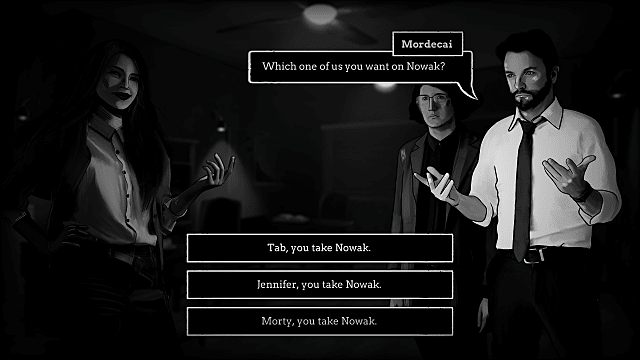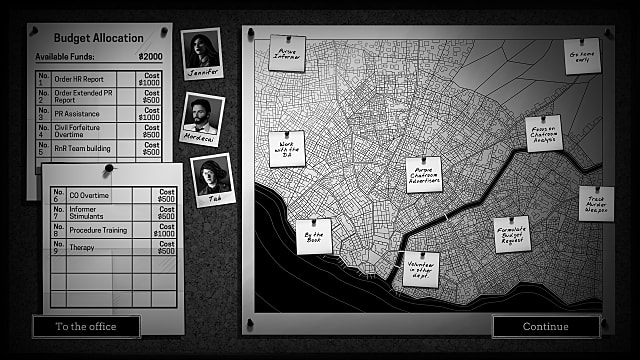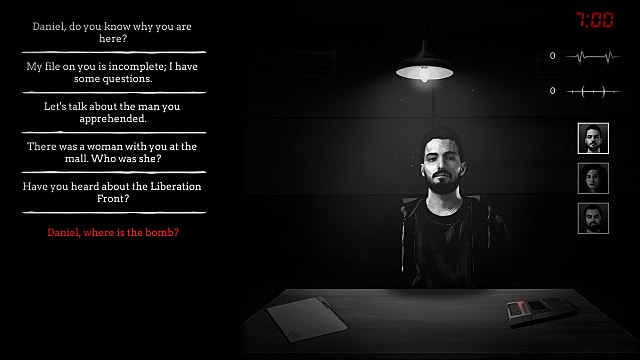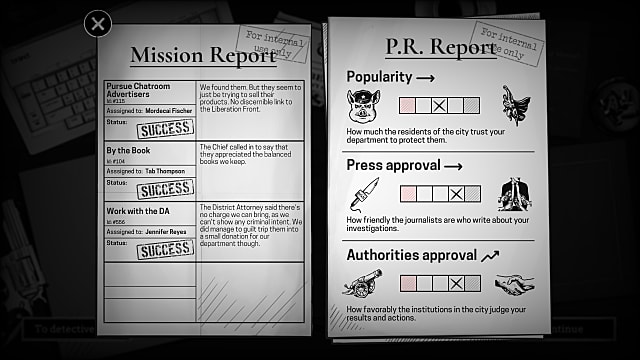

Straight off the bat, you'll realise that Interrogation: You Will Be Deceived, isn't trying to sugar coat anything. Well, before that you'll see that it has a stunning art-style. It's clear that the noir aesthetic is a way of signalling some of the things you should expect coming up.
The game starts with you learning how to interrogate people, and you do this by practising with an actor.
During this time you get acquainted with the tools at your disposal, lying, a heart rate monitor, a meter to display how open they're feeling, and the ability to turn off the recorder and beat the shit out of them. You'll need to manage all of this well as some of the interrogations are timed.
The timing aspect of some interrogations is interesting. Time advances every time you ask a question, rather than merely ticking down as you read the various options available to you. It gives you the opportunity to properly consider your approach, but it is offset a little by the multiple levels to many of the lines of questioning. You'll very easily waste time asking a question you already know the answers too.
You then skip forward in time and end up interrogating two suspects this time. You can flit between them and solve it, but the case matter is, once again, deeply uncomfortable.
Juggling multiple suspects adds a new layer, and knowing when to switch between them makes it all the more satisfying to solve. You then have to type up the press release, and then things open up a bit more.
Be the Person You Always Used to Be

You then get a chance to start shaping your character. You choose one of five traits from your past that influence how you can question suspects as the game continues.
You can choose to be highly empathetic, but lose the ability to use the shadier techniques at your disposal, or you can gain more time in interrogations, but lose the ability to look at the case files for each crime. These evolve into more complex options as you progress, and even include things like waterboarding. Which is certainly a choice.
After your first investigation, you get introduced to your initial team, all three of which are classic character archetypes. The timid nerdy one, the hardass, and the veteran cop who only trusts her instincts. They're all part of building and managing your task force. You can undertake missions and try and select the right person for each job.
You can see how likely they are to succeed at any given assignment if you choose to splash out on the HR report, but it costs a lot of money to order.
One nice touch is that they all have a 100% success rate if you choose to send them home early, which makes them better at balancing their work and personal life than many of us.
You also have to manage your budget, certain expenses will help you out in the long-run, but many of them are essential to figuring out what to do next. It's a tricky balance. Trying to figure out what you need at any given time is partly guess-work, partly intuition, but you can always just choose not to spend money and save it for another month.
On top of this, you have to manage the perception of your task force as well. That means keeping the authorities, the media, and the public on board. It's a cool idea. While it's hard to know precisely how to influence it, finding out how you're doing makes for a nice bonus at the end of each chapter.
Let's Talk About Your Job

Interrogation is full of decisions like these. Everything effectively plays out as though it is a visual novel, rather than it being a puzzle game. You even have to piece together a picture at one point that serves as a literal puzzle.
This feeling permeates through to the untimed investigations too, where sometimes the answer can be a little too obscure, and you have to jump between suspects and simply ask them everything you can.
While there are some smart conversation points here that link up naturally, others feel woefully weak comparatively and it leads to moments that feel unnatural. On top of this, the handling of mental health feels off. One of the early suspects has schizophrenia, and while the uncomfortable nature of his conversations may well be the point of their inclusion, it still feels wrong to have done so in the first place.
There is a strong streak of political ideology throughout as well. It's something that is worn with pride here, which is commendable in an age where politics are often shied away from.
Things like police brutality, government control, and anarchy are at the forefront of the story. The way it's handled is off though, making the player feel uncomfortable for using brutality is good, but the reasons for many of the anarchist members are tenuous at best.
Fascism Is Bad, Actually

Often they end up feeling incredibly cliche and if not that, are flat out absurd. For example, one of the cases has you asking someone about a suspects friend group; they state that they have friends in Antifa, and your character then says that's obviously why they're now taking hostages and threatening to kill people. That's not really a logical leap, but it feels as though using other groups may have been a better choice for that narrative.
It feels like there are plenty of moments where, despite some very natural interactions, things just don't add up. While there are moments of genuine human interaction within the game, they're often overshadowed by the ones that feel far less so. It just doesn't quite work, and it detracts from the experience considerably as a result.
Pros
- Stunning visual style
- Asks some interesting questions
Cons
- Mental health portrayals aren't great
- Writing isn't consistent enough
- Too many cliche characters
There are some interesting ideas here, and the multiple ways of dealing with the interrogations offer some replayability, but ultimately, each investigation comes down to how quickly you can work someone up before telling them to give themselves up. It's just not quite there, despite some interesting ideas.
It flits between feeling genuinely meaningful and edgelord, and the whiplash you get between the two really takes away from the experience. There's definitely a game here for some people, but there are better visual novels out there for most.
[Note: A copy of Interrogation: You Will Be Deceived was provided by Mixtivision for the purpose of this review.]
0 comments:
Post a Comment